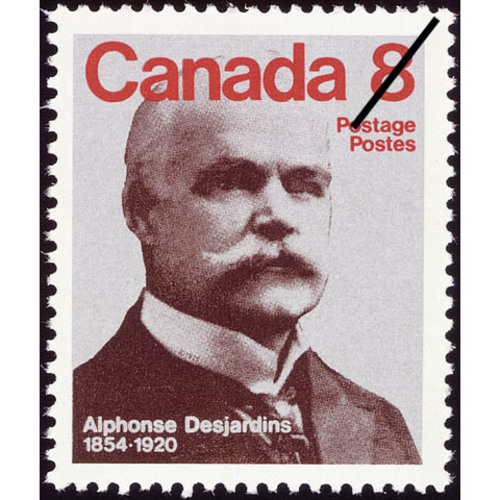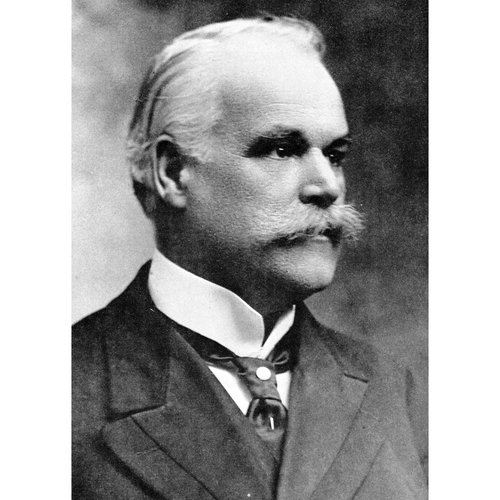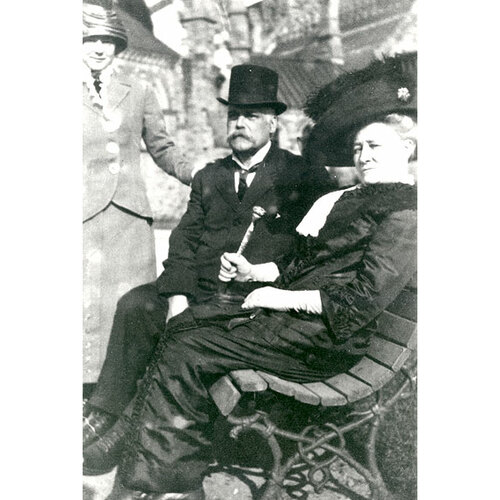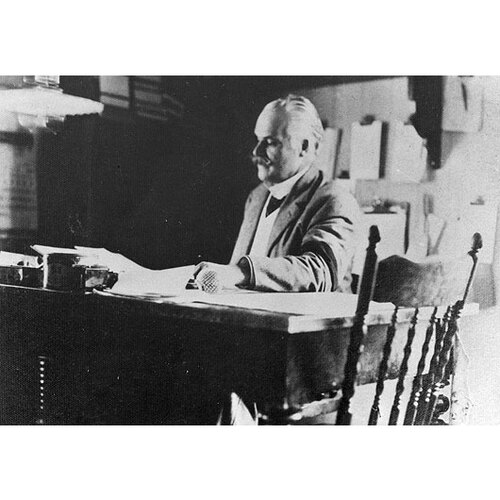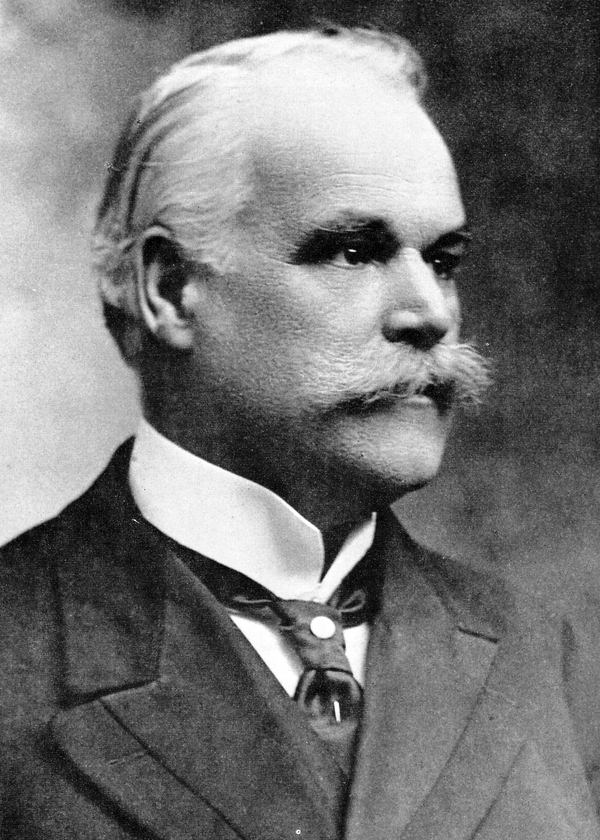
Source: Courtesy of Wikimedia Commons
DESJARDINS, ALPHONSE (baptized Gabriel-Alphonse), journalist, office holder, newspaper owner, and founder of the caisse populaire; b. 5 Nov. 1854 in Lévis, Lower Canada, son of François Roy, dit Desjardins, and Clarisse Miville, dit Deschênes; m. 2 Sept. 1879 Dorimène Roy-Desjardins* in Sorel, Que., and they had ten children, three of whom died in infancy; d. 31 Oct. 1920 in Lévis.
Alphonse Desjardins was the eighth of 15 children. His father, who had been a farmer before becoming a day labourer, occasionally handled business deals, but he was an alcoholic and could not hold a job for long. His mother had to do housework for the neighbours to make ends meet. Nevertheless, all the boys would succeed in carving out desirable careers for themselves. After finishing elementary school at the École Potvin, Desjardins attended the Collège de Lévis from 1864 to 1870, completing the four-year commercial course and the first year of the Latin one. His academic record shows that he was capable of excellent work but was inconsistent. He had to leave school in July 1870, probably because the classical program was too heavy a financial burden.
From 1869 Desjardins did his military service at the annual camps of the 17th (Lévis) Battalion of Infantry, in which his elder brother Louis-Georges was adjutant. Alphonse was soon promoted sergeant-major and on 17 Oct. 1871 was sent to the Red River settlement in Manitoba with a contingent of reinforcements that had been dispatched to repel a Fenian invasion [see John O’Neill*]. His military career was brief, however. On his return he found employment in 1872 with L’Écho de Lévis and the following year he was its Ottawa correspondent. When it ceased publication on 12 July 1876, Desjardins went to Quebec City and joined Joseph-Israël Tarte*’s editorial staff at Le Canadien, a newspaper of which Louis-Georges had recently become co-owner. In addition to short news items, press reviews, and the occasional column on local events in Lévis, he wrote a few lead stories. In 1877 and 1878 he was assigned to cover the debates in the Quebec Legislative Assembly.
Like Louis-Georges, Desjardins was active in the Conservative party. During the federal election of 1878 he served as secretary to its central committee in Lévis and participated in campaigning. His professional experience and political commitment earned him the position of recorder of debates at the Quebec Legislative Assembly from 1879 to 1889. He had to summarize the members’ speeches and report their main points in a publication subsidized by the government. In this period Desjardins was involved in cultural and economic organizations. He was president of the Institut Canadien de Lévis in 1883 and a member of the council of the Chambre de Commerce de Lévis from 1880 to 1893. On 14 Dec. 1889 Desjardins learned that, to reduce public expenditures, the government of Honoré Mercier* would no longer underwrite publication of the debates. In fact, since coming to power in 1887, Mercier’s Liberals had been planning to remove the work from the hands of this former Conservative activist, especially since his brother was a leader in the Conservative opposition at Quebec.
Faced with finding other employment, Desjardins returned to journalism. On 9 July 1891 in Lévis he launched L’Union canadienne, a daily in which he supported the program of the federal Conservative party. But on 10 October, for reasons of health, he had to cease publication. To obtain other work, he called on his political friends, with the result that on 22 April 1892 the Conservative government in Ottawa appointed him French-language stenographer for the House of Commons. He would hold this position until he retired in 1917.
But Desjardins was not one to be satisfied with the routines of a civil servant. Attentive listening to parliamentary debates set him thinking and asking himself questions about the country’s social and economic problems. And it was in the reforms proposed by Catholics who were concerned with social issues that he sought solutions. He read (doubtless shortly after its publication in 1891) the encyclical Rerum novarum, which had a profound influence on him. He also kept abreast of the work of French sociologist Frédéric Le Play and other writers connected with that school of thought. A subscriber to the magazine La Réforme sociale (Paris), in 1899 he became a member of the Société Canadienne d’Économie Sociale de Montréal.
As for practical matters, Desjardins was especially fascinated by mutual aid societies. In 1893 he put together a massive file of “notes to be used for a study of life insurance.” There were many mutualists among his acquaintances. One of his elder brothers, François-Xavier, was a publicist for the Union Saint-Joseph d’Ottawa, a mutual aid society [see Jacques Dufresne*]. His fellow citizens in Lévis had set up a number of such organizations, including a branch of the Société des Artisans Canadiens-Français, which opened in 1889, and the Société de Construction Permanente de Lévis, which had been founded in 1869. From 1892 to 1895 Desjardins sat on the board of directors of the latter company, which provided mortgage loans to its members.
A bill to prevent usurious practices, introduced in the House of Commons on 6 April 1897 by Conservative Michael Joseph Francis Quinn, marked a turning-point in Desjardins’s life. Quinn cited the case of a Montreal man sentenced to pay interest charges of $5,000 on an initial loan of $150. Desjardins was deeply disturbed and became more aware than ever of the gaps in the way credit was organized. Small borrowers had almost no access to ordinary banks. How could they be kept from having to turn, in their need for a loan, to moneylenders who often had no hesitation in exploiting them? This question would not go away. A little later he came across a book by the Englishman Henry William Wolff, People’s banks, a record of social and economic success (London and New York, 1893). On 12 May 1898 he wrote to Wolff, seeking further information. Through him Desjardins obtained the names of many French, Belgian, Italian, and Swiss cooperators, who were all directors of people’s banks or rural credit unions, and he got in touch with them. He spent several months carefully studying the documentation he was sent and trying to assess the merits of the diverse models of credit cooperatives. Taking into account the economic, social, and cultural differences between Canada and Europe, he opted for a new model largely based on European rules of organization.
As time went on Desjardins interested others in his work. He often discussed the project with his curé, François-Xavier Gosselin, and with priests at the Collège de Lévis, where from 1893 to 1900 he taught shorthand during the intervals between parliamentary sessions. He also solicited the advice of fellow mutualists, among whom he recruited the colleagues who helped him to draft a constitution and by-laws and to set up his savings and loan cooperative.
The Caisse Populaire de Lévis was founded on 6 Dec. 1900 at a meeting attended by about 100 people, including several leading figures in the city. It was defined as a cooperative savings and loan society with limited liability and fluctuating capital. Its structure was similar to that of Italian people’s banks but it also had characteristics borrowed from German rural credit unions. Its only unique organizational rule was that of fluctuating capital, which permitted members to demand a refund of their five-dollar share at any time with due notice. The essential function of the caisse was to extend loans to members using their collective savings. While it provided easier access to credit, it sought also to develop habits of thrift and foresight.
On 23 Jan. 1901 the Caisse Populaire de Lévis began operations. It was a success from the start, thanks to the tireless work of Desjardins and the unwavering support of Father Gosselin and the priests at the Collège de Lévis. By 30 November it had 721 members, who held nearly 2,000 shares at five dollars a share. Desjardins was jubilant and believed more strongly than ever in the ideal he had pursued since the beginning: “to create a vast network of caisses populaires.” But before this could happen, he had to gain acceptance for the idea that the caisse populaire was the kind of credit cooperative best suited to the needs of the people of Quebec. Indeed, Desjardins was not the only one in the province taking an interest in the matter of people’s loans. For several years promoters of agriculture had been thinking of introducing the system of German rural credit unions set up by Friedrich Wilhelm Raiffeisen, in the hope of providing a source of loans for farmers. In January 1900 the Conservative mla for Wolfe, Jérôme-Adolphe Chicoyne*, had in fact introduced a bill to this effect. After being redrafted twice, the measure was finally adopted as the Quebec Agricultural Syndicates’ Act of 1902.
Not long after the passage of this law, which he would certainly have liked to block, Desjardins took the first steps towards getting the federal parliament to provide a legal framework for the operation of caisses populaires. He already had the support of Frederick Debartzch Monk, the leader of the Quebec wing of the federal Conservative party, Henri Bourassa*, and, from the government side, Rodolphe Lemieux* and Solicitor General Henry George Carroll*. However, the minister of finance, William Stevens Fielding*, thought caisses populaires came under provincial jurisdiction because, strictly speaking, they were merely local organizations and were not in the banking business. In 1904 Desjardins tried in vain to make him change his mind. He had no greater success with the prime minister, Sir Wilfrid Laurier, who gave him an interview on 24 July. Possibly he did not get a better hearing because he had been a Conservative activist. Be that as it may, he realized he would achieve nothing unless he brought strong pressure to bear on the government.
Fortunately, time was on his side. The Caisse Populaire de Lévis continued to enjoy success, from which its founder gained increasing renown. Many now regarded him as an authority in his field. An indefatigable worker who was persistent, methodical, and meticulous, he planned everything carefully, leaving nothing to chance. Through study and practice he had gained a reputation as an expert who inspired confidence. Proud and perhaps a bit vain, he knew how to present his accomplishments in the best light. He was not a gifted orator, however, and was even described as “slightly austere,” “with no outward attractiveness.” His strength lay in his intelligence, competence, and organizational flair.
Late in 1904 Desjardins succeeded in setting up an association to support him in his dealings with the federal government. Founded at the Université Laval on 21 December, the Action Populaire Économique had as one of its aims the passage of legislation that would develop savings and loan cooperatives in Canada. Such prominent figures as Archbishop Louis-Nazaire Bégin*, Edmund James Flynn*, Adélard Turgeon*, Thomas Chapais*, and Charles Langelier agreed to become members of it. The lobbying of the group and its members’ petitions to Laurier had no effect, however. In desperation, Desjardins turned to the provincial government. In March 1905 he submitted to the attorney general, Horace Archambeault, a bill he had drafted with lawyer Eusèbe Belleau. Lomer Gouin*, who became premier and attorney general shortly thereafter, seemed favourable, but there was an obstacle. The bill was just a reworded version of the 1902 Quebec Agricultural Syndicates’ Act, and would logically have required repeal of that law. The government wanted time to examine the question thoroughly, and the session ended before a decision was taken.
Desjardins and his wife, Dorimène, were deeply disappointed. Since 1903 she had served as manager of the caisse in Lévis whenever he was in Ottawa. It now had more than $40,000 in assets, and she worried more and more about their personal responsibility in the absence of legal protection. Desjardins had also organized three other caisses, in Saint-Joseph-de-la-Pointe-de-Lévy, Hull, and Saint-Malo, Que., which were in the same unfortunate situation. The couple were clearly on the verge of despair. In May, Desjardins even confided to a priest at the Collège de Lévis that he was thinking of liquidating everything, but the support and encouragement of Father Gosselin and Archbishop Bégin helped them get a grip on themselves.
In 1906 everything was settled. On 28 February Gouin introduced in the assembly the proposed Quebec Syndicates’ Act, which was passed unanimously on 5 March and received royal assent four days later. It was truly a victory for Desjardins. At last, he wrote, “the work can take off . . . , assert itself, and stop living in the shadows.” This statute also made the caisse populaire the basic model on which savings and loan cooperatives would henceforth be organized in Quebec.
Desjardins did not abandon his goal of a federal law, however. On 23 April 1906 Monk introduced in the commons a bill drafted by Desjardins. It was sent to a select committee for study, which on 11 April 1907 recommended “that the government take charge of the measure and have it passed.” The Act respecting industrial and co-operative societies was adopted unanimously by the commons on 6 March 1908. On 15 July, breaking with custom, the Senate blocked it, on the grounds that it would infringe on the powers of the provinces. Clearly many senators did not share this view, since the legislation was defeated by a single vote. Some of its opponents were under pressure from the Retail Merchants’ Association of Canada, which objected to it because it would have allowed the creation of potential competitors in the form of consumers’ cooperatives. Until 1914 a few mps would try in vain to enlist the House of Commons in getting legislation on cooperation passed.
The years from 1907 to 1915 were the most active of Desjardins’s career. He began promoting the establishment of other caisses populaires in the fall of 1907. Abbé Philibert Grondin, a young priest at the Collège de Lévis, joined him in conducting a publicity campaign in the press. From 1909 Grondin’s articles appeared almost every week in La Vérité and occasionally in L’Action catholique. In 1910 he brought out Le Catéchisme des caisses populaires, a little booklet that by questions and answers presented all necessary information about the aims, organization, and functioning of these institutions. For his part, Desjardins busied himself answering the many requests for information, and took every opportunity to give public lectures. He also published, in pamphlet form or in newspapers and magazines, many articles in which he pointed out the merits of his caisses populaires. The economic and social thinking set out is clear and coherent, with a touch of satire. Desjardins observed that the common people were victims of the concentration of economic power and the many abuses of capitalism, and he stressed their isolation and lack of economic organization. By joining together to form cooperative enterprises, workers and small producers would be best able to defend their financial interests. He associated cooperation with the ideals of democratization and economic decentralization. Through the caisses populaires, he also hoped to foster agricultural development, stem emigration from rural areas to American towns, and thus ensure “the greatness and future prosperity of the country.” By consolidating savings, the caisses would make it possible to form a “national capital fund” through which French Canadians could increase their influence and protect their interests as a people.
The caisse populaire was no ordinary financial enterprise. Desjardins defined it as a social undertaking in the sense of the church’s teachings on society, an entity the parish élite ought to encourage in order to improve the material and spiritual conditions of the common people. In particular, Desjardins counted on the clergy, whom he asked to participate in the administration and, if necessary, the management, of the caisses. Concerned about social issues, of which Rerum novarum had made them more aware, they were taking an increasing interest at the turn of the century in organizations that might contribute to the material and spiritual uplifting of the working classes [see Stanislas-Alfred Lortie]. They saw such institutions as a way of defusing social conflict, counteracting socialist propaganda, and protecting religious values and the church’s moral authority. They also considered them necessary to stimulate agricultural progress and to slow the exodus from the land and emigration to the United States. Convinced of the benefits of people’s savings and credit, a number of bishops hastened to recognize the caisses populaire as a Catholic social undertaking which they recommended to their clergy’s attention. The Catholic social action organizations set up during the years from 1900 to 1910 included the caisses among the means of achieving their goals. As a result, Desjardins was invited to speak at the youth congress organized by the Association Catholique de la Jeunesse Canadienne-Française in 1908, and at the congress of the Ligues du Sacré-Cœur in 1910. He was even invited to the sacerdotal congress in Montreal in 1913, where he was the only lay speaker. That year, on the recommendation of Archbishop Bégin, Pope Pius X made Desjardins a commander of the Order of St Gregory the Great in recognition of his Christian dedication and his contribution to social action. The clergy apart, a few key figures in the nationalist movement, such as Henri Bourassa and his colleague Omer Héroux*, were among the most ardent promoters of the caisses populaires.
Thanks to all this support, the caisses populaires became more and more widely known. Desjardins said he was swamped by requests from people who wanted to organize a caisse in their parish. From 1907 to 1915 he founded no fewer than 136. He also made an effort to supervise their operations, and to that end he corresponded regularly with many managers. He accomplished all this in his spare time, with no financial assistance whatever. He often thought about the possibility of a government grant to the Action Populaire Économique to finance a publicity service, for which he would be responsible, but the fear of political interference kept him from making any such official request.
Desjardins’s accomplishments were noted in several Canadian provinces, and in particular by the French-speaking communities in the west. However, Ontario was the only province to which he extended his activities. He founded 18 caisses populaires there between 1910 and 1913, in addition to helping organize a caisse d’économie in 1908 for federal civil servants in Ottawa.
As early as 1908 the fame of the caisses populaires had spread beyond the borders of Canada. Desjardins received many American visitors, and requests for information kept flooding in. He visited the United States five times between 1908 and 1912, going to New Hampshire, Massachusetts, New York City, and Rhode Island. He was welcomed by politicians and various associations to which he spoke, and in Massachusetts and New York City he helped draft bills that would lead to the creation of savings and loan cooperatives similar to the caisses populaires. Desjardins also took advantage of these trips to set up some ten caisses populaires, mostly in French-speaking communities in Massachusetts, where he spent five weeks in June and July 1911. In 1912 he was even invited to Washington by the president of the United States, William Howard Taft, to take part in a conference of American governors on agricultural credit.
In 1914 Desjardins began to feel the first symptoms of the uraemia that would frequently force him during the last six years of his life into convalescence between brief periods of remission. In 1916 he reluctantly handed over responsibility for founding caisses to a committee under Abbé Grondin. The following year he had to give up his duties as House of Commons stenographer. With the help of his daughter Albertine, his wife, and Grondin, he carried on as well as he could his correspondence with a number of caisse managers and directors, to whom he gave advice and encouragement. Knowing that his illness was terminal, he anxiously considered ways of ensuring that his work would endure. He wanted to bring the caisses together within a federation, as the European systems did, that would make available the technical and financial services necessary for their security and growth. This federation would be responsible for carrying out an annual inspection of its member institutions and would organize a central caisse to administer the surplus funds held by some local caisses and provide loans to those others short of money. But Desjardins felt a resistance on the part of the caisses. They objected to the idea of paying dues to finance the federation and were afraid of losing their autonomy. Three months before his death he proposed, without success, that they hold a meeting to study his plan. There were at that time in Quebec some 140 active caisses with a total membership of more than 30,000 and assets of $6,300,000.
Although it remained unfinished, the work of Alphonse Desjardins aroused admiration, and many of his contemporaries had been able to grasp its full social and economic significance. La Vérité saw it as “a heritage whose value cannot yet be estimated.” L’Action catholique predicted that the caisses would become “the solid base of the French Canadian national fortune,” and saluted their founder as “one of the great benefactors of his race.”
[The principal source for the career of Alphonse Desjardins is the Fonds Alphonse Desjardins, held by the Confédération des Caisses Populaires et d’Économie Desjardins du Québec, in Lévis, Que. Much information is also provided by the minutes of the annual general meetings and of the board of directors of the Caisse Populaire de Lévis, available at its offices in Lévis. A good deal of the correspondence between Desjardins and Archbishop Bégin is held in AAQ, 70 CF.
Several newspapers were consulted, among them Le Canadien, 1er août 1876–31 déc. 1879, L’Écho de Lévis, 1er janv. 1872–28 juill. 1876, L’Union canadienne (Lévis), 9 juill.–10 oct. 1891, and La Vérité (Québec), 1906–20. Other newspapers including Le Devoir and L’Action catholique (Québec) were examined selectively.
Apart from the records of Desjardins’s birth (ANQ-Q, CE1-100, 6 nov. 1854) and marriage (ANQ-M, CE3-7, 2 sept. 1879), all of the relevant sources are found in the bibliography and footnotes of Pierre Poulin’s Histoire du mouvement Desjardins (2v. parus, Montréal, 1990– ), vol.1 (Desjardins et la naissance des caisses populaires, 1900–1920); this work includes a list of publications by Desjardins, several of which appeared under the pseudonyms Miville Roy and Miville Deschênes. Readers should also consult Yves Roby, Alphonse Desjardins et les caisses populaires, 1854–1920 (Montreal, 1964) and Ronald Rudin, In whose interest? Quebec’s caisses populaires, 1900–1945 (Montreal and Kingston, Ont., 1990). p.p. and g.b.]
Cite This Article
Pierre Poulin and Guy Bélanger, “DESJARDINS, ALPHONSE (baptized Gabriel-Alphonse) (1854-1920),” in Dictionary of Canadian Biography, vol. 14, University of Toronto/Université Laval, 2003–, accessed April 30, 2025, https://www.biographi.ca/en/bio/desjardins_alphonse_1854_1920_14E.html.
The citation above shows the format for footnotes and endnotes according to the Chicago manual of style (16th edition). Information to be used in other citation formats:
| Permalink: | https://www.biographi.ca/en/bio/desjardins_alphonse_1854_1920_14E.html |
| Author of Article: | Pierre Poulin and Guy Bélanger |
| Title of Article: | DESJARDINS, ALPHONSE (baptized Gabriel-Alphonse) (1854-1920) |
| Publication Name: | Dictionary of Canadian Biography, vol. 14 |
| Publisher: | University of Toronto/Université Laval |
| Year of revision: | 1998 |
| Access Date: | April 30, 2025 |


